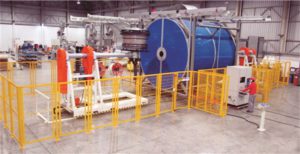 Rotoline USA exhibited at the Society of Plastics Engineers’ Rotational Molding conference in Cleveland and organized a tour of the 38,000-square-foot plant in Kent, which opened in late 2013 by Brazilian rotational molding machinery manufacturer Rotoline Industrial Equipment Ltda.
Rotoline USA exhibited at the Society of Plastics Engineers’ Rotational Molding conference in Cleveland and organized a tour of the 38,000-square-foot plant in Kent, which opened in late 2013 by Brazilian rotational molding machinery manufacturer Rotoline Industrial Equipment Ltda.
The operation now has six employees, including rotomolding veteran Alain St. Pierre, recently hired sales head Mike Pierron, and Jovan Calhoun, who handles everything from parts and service to installation of machines at customer plants.
Major components of the rotomolding machines are shipped to the Kent operation from Brazil. In Kent, Rotoline USA handles assembly and controls, and sources some components from U.S. suppliers. The Kent facility usually houses about six machines, St. Pierre said. Three machines were in various stages of assembly during the rotomolding conference tour.
Rotoline had sold machines to the United States and Canada for years before it started the U.S. operation. St. Pierre said about 120 Rotolines have been installed in the two countries.
St. Pierre said the automation can be retrofitted on existing machines, including any brand of rotomolder. Rotomolding is known as a labor-intensive process, but that is changing. “We’re headed toward automation,” he said. “We’re moving more and more to automation.”
Another feature of Rotoline machines is the RWTC, or Rotoline Wireless Temperature Controller, which monitors internal temperature control of the mold during the entire production cycle, from heating in the oven through cool-down. The cycle time is controlled by temperature, which he said is more accurate than simply measuring the molding cycle by time.
RWTC — which is now standard and integrated on all Rotoline machines — runs through the machine controller. St. Pierre said the technology “takes out takes out the human factor. You don’t have to add a minute or take out a minute. It’s automatic.”
Rotoline makes shuttle, carousel, rock-and-roll and laboratory-sized machines.


